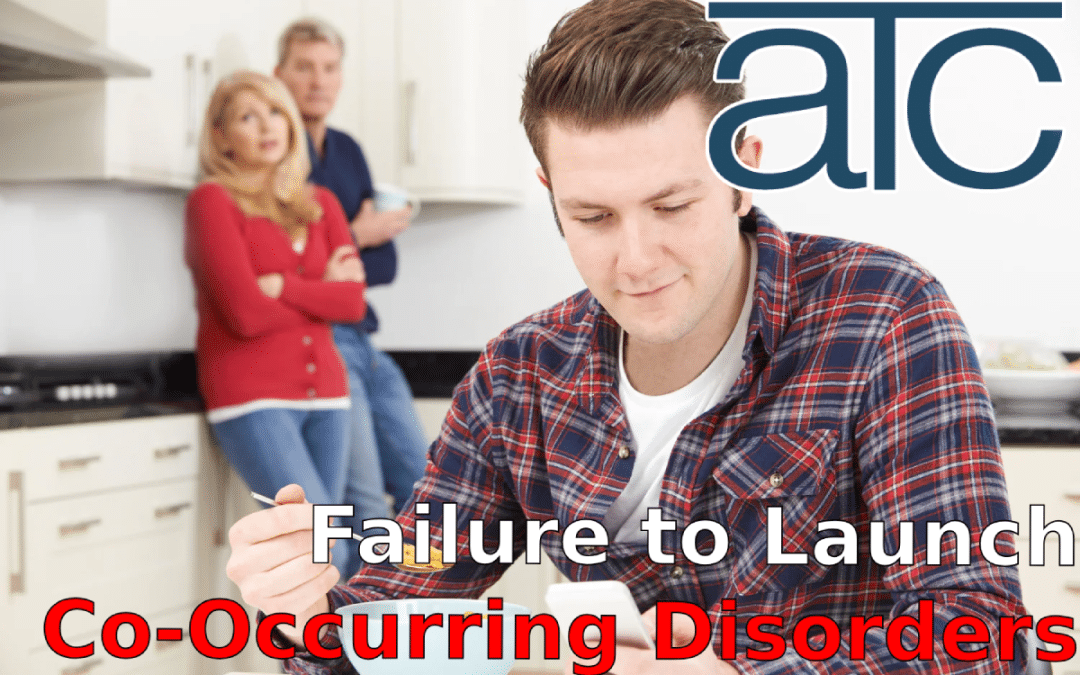Co-Occurring Disorders in Failure to Launch Syndrome
Are you worried about your teen’s future? Many parents feel lost when their kids can’t seem to grow up. This is called Failure to Launch Syndrome (FTL). It’s not a real medical term but it shows up when young people can’t live on their own. FTL often comes with other mental health Co-occurring Disorders. These can make it hard for teens to grow up. Did you know that about 1 in 5 teens have a mental health problem? That’s a lot! This post will help you identify the most common ones that come with FTL.
We’ll also share ways to help your teen. Ready to get started?
Key Facts
- Failure to Launch Syndrome often comes with other mental health issues like anxiety, depression, ADHD, autism, substance use disorders.
- 1 in 5 teens have a mental health problem which makes it hard for them to become independent adults.
- Treatments for FTL and related disorders include cognitive behavioral therapy, motivational interviewing, family therapy, life skills training, substance use counseling.
- Families can help by setting clear rules, teaching life skills, offering emotional support and letting teens face natural consequences of their choices.
- Early detection and professional help are key to guiding teens with FTL toward a better future.

Failure to Launch Syndrome comes with extra baggage. Young adults may have mental health issues on top of their inability to launch.
Anxiety Disorders
Anxiety co-occurring disorders make life hard for teens trying to launch into adulthood. These can cause worry, fear and panic that gets in the way of normal life. Many young people can’t leave home, start college or get a job because of their anxiety.
It’s like having a constant voice in your head saying “you can’t do this” or “something bad will happen”. This can lead to avoiding new situations or isolating from others.
I’ve seen anxiety hold teens back. My nephew Jake had such bad social anxiety he couldn’t even order food at restaurants. He’d freeze up and panic when talking to strangers.
This made it super hard for him to interview for jobs or meet new people at school. With therapy and practice he slowly built up his confidence. Now he’s much more comfortable putting himself out there.
Anxiety is hard but there’s ways to work through it and still get to your goals.
Depression
Depression affects teens trying to launch into adulthood big time. It’s not just sadness. These young people feel stuck and hopeless.
Their sleep patterns become irregular, either too much or too little. Activities they used to love no longer interest them. Some may even contemplate suicide. This mental health condition can hold them back in life.
Seeking help is key for teens with depression and struggling to launch into adulthood. Therapy can give them coping strategies and boost self esteem. In some cases medication may be needed.
Family support is important too. Parents can encourage small steps towards independence. They can model healthy ways to manage stress. With the right support teens can overcome depression and start to thrive.
ADHD (Attention-Deficit Hyperactivity Disorder)
ADHD makes it hard for teens to launch into adulthood. This disorder affects focus, impulse control and activity levels. Teens with ADHD struggle to plan ahead, stay organized and finish tasks.
These can make it hard to handle adult responsibilities like paying bills or keeping a job.
Many teens with ADHD also have other issues. They may feel anxious or down about their struggles. Some turn to drugs or alcohol to cope. Getting the right help is crucial. Therapy, life skills training and sometimes medication can make a big difference.
With support teens with ADHD can learn to manage their symptoms and move forward in life.
Autism Spectrum Disorders (ASD)
Autism Spectrum Disorders (ASD) often overlap with failure to launch syndrome in teens. Many young adults with ASD can’t live on their own. They may have social skills issues, sensory overload and daily tasks.
These can make it hard to move out, get a job or go to college. Teens with ASD may need extra support to become independent.
Parents can help by teaching life skills one step at a time. This means things like cooking, cleaning and managing money. Therapy can also be helpful. It can focus on social skills and coping with change.
Some programs offer special support for young adults with ASD who are trying to launch into adulthood. These programs can teach job skills and how to live alone.
Substance Use Disorders
Substance use disorders often accompany failure to launch syndrome in teens. Many young people turn to drugs or booze to cope with stress or boredom. This habit can quickly get out of control.
Alcohol and weed are the usual choices. They seem fun at first but can make other mental health issues worse. Soon getting high becomes more important than growing up.
I’ve seen this play out with my own nephew. He started smoking pot in high school to fit in. Before long he was using daily and couldn’t hold down a job. His anxiety got worse not better.
He’s doing better now and living on his own. Early intervention is everything for teens with drugs and failure to launch.
Effective Interventions for FTL and Co-Occurring Disorders
Getting help for Failure to Launch (FTL) and other mental health issues is key. There are many ways to treat these problems that work well. Let’s look at some top methods that can make a big difference.
Cognitive Behavioral Therapy (CBT)
Cognitive Behavioral Therapy (CBT) is an effective approach for teens struggling with failure to launch. It helps them identify and modify unhelpful thoughts and behaviors. In my work with young clients, I’ve observed CBT make a significant impact.
One teen I worked with learned to challenge his “I can’t do it” thoughts. He began taking small steps towards his goals, gaining confidence along the way.
CBT also teaches coping skills for difficult emotions. Teens learn to confront fears instead of avoiding them. They practice new ways to manage stress and solve problems. This therapy often includes assignments to apply new skills in real-life situations.
Over time, CBT can improve self-esteem and motivation, key factors in overcoming failure to launch.
Motivational Interviewing
Motivational Interviewing is a powerful tool for helping teens with Failure to Launch. This method taps into a person’s own desire to change. It’s not about telling them what to do.
Instead, it’s about guiding them to find their own reasons to move forward. I’ve seen it work wonders with my own clients. They often come in feeling stuck, but leave with a new spark of motivation.
This approach uses open-ended questions and reflective listening. It helps teens explore their goals and values. They start to see how their current actions might not line up with what they really want.
This can lead to “aha” moments that spark real change. It’s amazing to watch a teen go from “I can’t” to “I’ll try” during these talks.
Family Therapy
Family therapy brings everyone together to tackle issues head-on. It’s a team effort where parents and kids learn to talk openly and solve problems. A skilled therapist guides the family to spot unhealthy patterns and find better ways to interact.
This approach can really help teens who struggle to launch into adulthood.
In these sessions, families often discover hidden strengths. They might role-play tough situations or practice new communication skills. The goal is to build a support system that works for everyone.
With time and effort, family therapy can lead to stronger bonds and smoother transitions for teens facing failure to launch challenges.
Life Skills Training
Life skills training is a key part of helping teens with failure to launch. It gives them tools to handle daily life and grow into capable adults.
- Money Management: Teens learn to budget, save, and spend wisely. They practice using bank accounts and credit cards safely.
- Job Readiness: Training covers resume writing, job searching, and interview skills. Teens also learn about workplace norms and how to keep a job.
- Time Management: Teens gain skills to plan their days, set goals, and meet deadlines. They learn to balance work, school, and fun.
- Self-Care: Training teaches healthy habits like good sleep, exercise, and nutrition. Teens also learn stress relief methods like deep breathing.
- Social Skills: Teens practice making friends, working in teams, and solving conflicts. They learn how to talk to adults and peers with respect.
- Home Management: Training covers cooking, cleaning, and basic home repairs. Teens learn to do laundry and keep their living space tidy.
- Decision Making: Teens learn to weigh options, think about outcomes, and make smart choices. They practice solving real-life problems.
- Emotional Control: Training helps teens name their feelings and cope with them. They learn ways to calm down when upset or angry.
- Tech Skills: Teens get tips for safe internet use and social media. They also learn basic computer skills needed for work and school.
- Health Care: Training covers how to make doctor visits, fill prescriptions, and handle minor health issues. Teens learn about insurance too.
Substance Use Counseling
Substance use counseling tackles drug issues head-on. It helps teens understand why they use and how to stop. Counselors teach coping skills and ways to resist temptation. They also work on any mental health problems that fuel drug use.
This team approach gives teens the best shot at getting clean and staying that way.
I’ve seen firsthand how this counseling can turn lives around. One teen I worked with kicked a nasty pot habit through weekly sessions. We dug into the anxiety driving his use and found healthier ways to deal with stress.
With time and effort, he got back on track at school and rebuilt trust with his family. It wasn’t easy, but the right support made all the difference.
Strategies for Families Supporting Young Adults with FTL
Families play a key role in helping young adults with Failure to Launch (FTL). Here are some strategies to support them while promoting independence:
- Set clear boundaries: Create house rules and stick to them. This might include chores, curfews, or job search requirements.
- Encourage small wins: Help your child set tiny, doable goals. These could be making their bed daily or applying for one job a week.
- Offer emotional support: Listen without judgment. Validate their feelings, but avoid solving all their problems.
- Promote life skills: Teach basic adulting tasks like cooking, budgeting, and laundry. Let them practice these skills regularly.
- Seek outside help: Consider family therapy or support groups. A mental health pro can guide both you and your child.
- Foster social connections: Encourage your child to join clubs or volunteer. Social ties can boost confidence and motivation.
- Model healthy habits: Show good self-care and stress management. Your example can inspire positive changes.
- Celebrate progress: Notice and praise small steps forward. This can build self-esteem and drive.
- Allow natural consequences: Let your child face the results of their choices. This teaches responsibility without harsh punishment.
- Practice patience: Change takes time. Stay hopeful and keep supporting your child’s growth journey.
Teens struggling to transition into adulthood frequently experience multiple mental health co-occurring disorders and challenges. This complicates their journey to independence. Fortunately, with appropriate support, these young individuals can develop and flourish.
Recognizing early indicators and obtaining professional assistance is crucial. Through collaborative efforts between families and experts, teens can be guided toward a more promising future.
Take action now – seek help and witness your teen’s progress!

Frequently Asked Questions
-
What are the most common failure to launch disorders in teens?The top failure to launch disorders in teenagers often include depression, substance abuse, and attention deficit hyperactivity disorder (ADHD). These mental health conditions can make it tough for young people to move forward in life.
-
How does substance misuse relate to failure to launch?Substance misuse and failure to launch often go hand in hand. Teens might turn to drugs or alcohol to cope with stress or low self-esteem. This self-medication can lead to addiction and make it harder to become independent.
-
Can you explain the link between failure to launch and mood disorders?Mood disorders like bipolar disorder or depression can throw a wrench in a teen's plans. These conditions mess with emotions and motivation, making it hard to tackle life's challenges. It's like trying to climb a mountain with a heavy backpack.
-
What role does trauma play in failure to launch?Childhood trauma or a traumatic event can leave deep scars. Post-traumatic stress disorder (PTSD) can make teens feel stuck, affecting their ability to move forward. It's like trying to run a race with your shoelaces tied together.
-
How do developmental disorders impact failure to launch?Developmental disorders, such as Asperger's syndrome, can make social interactions and life transitions tricky. These challenges can slow down a teen's progress towards independence. It's like trying to read a map in a foreign language.
-
What treatment options exist for teens with failure to launch and co-occurring disorders?Treatment often involves a mix of individual therapy, mindfulness techniques, and sometimes medication. For those dealing with substance abuse, addiction treatment may be needed. The goal is to boost self-efficacy and resilience, helping teens get back on track.

Recent Comments